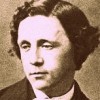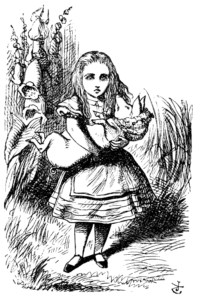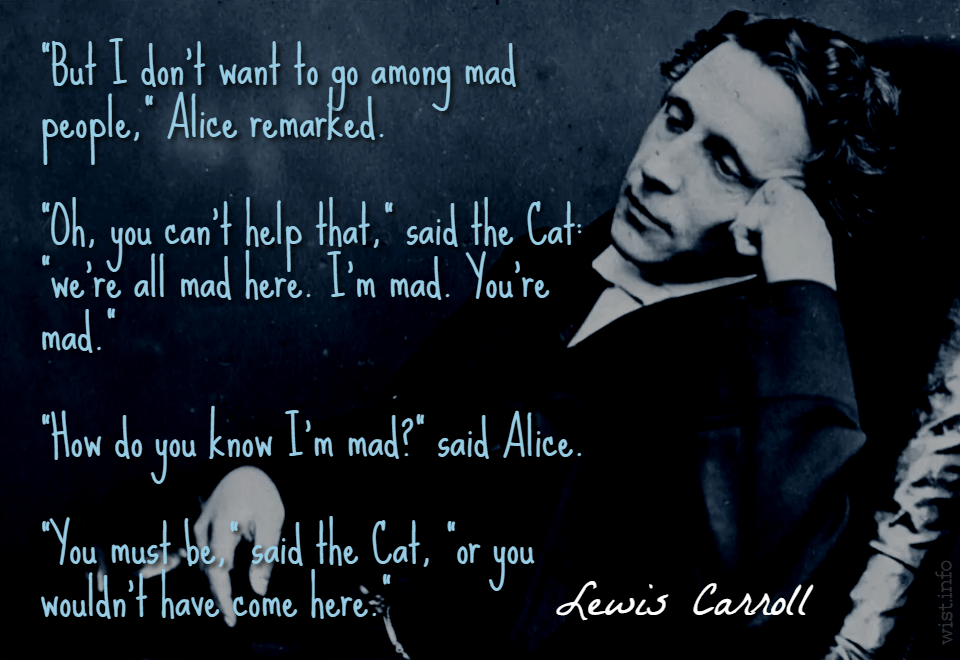You’re mad, bonkers, off your head … but I’ll tell you a secret … all of the best people are.
Lewis Carroll (1832-1898) English writer and mathematician [pseud. of Rev. Charles Lutwidge Dodgson]
(Spurious)
This is attributed on many pages as a quote from Carroll's Alice in Wonderland. No such quote exists in the book, and the word "bonkers" does not appear until the 1940s. This appears to be a paraphrase of lines from the 2010 Tim Burton adaptation of Carroll's work (screenplay by Linda Woolverton):
HATTER: Have I gone mad?
ALICE: [checking his temperature] I'm afraid so. You're entirely bonkers. But I'll tell you a secret. All the best people are.
Quotations by:
Carroll, Lewis
How queer everything is to-day! And yesterday things went on just as usual. I wonder if I’ve been changed in the night? Let me think: was I the same when I got up this morning? I almost think I can remember feeling a little different. But if I’m not the same, the next question is, “Who in the world am I?” Ah, that’s the great puzzle!
One day Alice came to a fork in the road and saw a Cheshire cat in a tree. “Which road do I take?” she asked.
“Where do you want to go?” was his response.
“I don’t know,” Alice answered.
“Then,” said the cat, “it doesn’t matter.”
I don’t think they play at all fairly, and they all quarrel so dreadfully one can’t hear oneself speak — and they don’t seem to have any rules in particular; at least, if there are, nobody attends to them — and you’ve no idea how confusing it is
“Would you tell me, please, which way I ought to go from here?”
“That depends a good deal on where you want to get to,” said the Cat.
“I don’t much care where –” said Alice.
“Then it doesn’t matter which way you go,” said the Cat.
“-– so long as I get SOMEWHERE,” Alice added as an explanation.
“Oh, you’re sure to do that,” said the Cat, ‘if you only walk long enough.”
“I quite agree with you,” said the Duchess; “and the moral of that is — ‘Be what you would seem to be’ — or, if you’d like it put more simply — ‘Never imagine yourself not to be otherwise than what it might appear to others that what you were or might have been was not otherwise than what you had been would have appeared to them to be otherwise.'”
“If it had grown up,” she said to herself, “it would have made a dreadfully ugly child: but it makes rather a handsome pig, I think.” And she began thinking over other children she knew, who might do very well as pigs.
Lewis Carroll (1832-1898) English writer and mathematician [pseud. of Rev. Charles Lutwidge Dodgson]
Alice’s Adventures in Wonderland, ch. 6 “Pig and Pepper” [Alice] (1865)
(Source)
‘Where shall I begin, please your Majesty?’ he asked.
‘Begin at the beginning,’ the King said, gravely, ‘and go on till you come to the end: then stop.’
“But I don’t want to go among mad people,” Alice remarked.
”Oh, you can’t help that,” said the Cat: “we’re all mad here. I’m mad. You’re mad.”
”How do you know I’m mad?” said Alice.
”You must be,” said the Cat, “or you wouldn’t have come here.”Lewis Carroll (1832-1898) English writer and mathematician [pseud. of Rev. Charles Lutwidge Dodgson]
Alice’s Adventures in Wonderland, ch. 6 “Pig and Pepper” (1865)
(Source)
“Reeling and Writhing, of course, to begin with,” the Mock Turtle replied, “and then the different branches of Arithmetic — Ambition, Distraction, Uglification, and Derision.”
I am strongly of opinion that an author had far better not read any reviews of his books: the unfavourable ones are almost certain to make him cross, and the favourable ones conceited; and neither of these results is desirable.
Well, in our country,” said Alice, still panting a little, “you’d generally get to somewhere else — if you ran a very long time as we’ve been doing.”
“A slow sort of country!” said the Queen. “Now, here, it takes all the running you can do, to keep in the same place. If you want to get somewhere else you must run at least twice as fast as that!”
“When I use a word,” Humpty Dumpty said, in rather a scornful tone, “it means just what I choose it to mean — neither more nor less.”
“The question is,” said Alice, “whether you can make words mean so many different things.”
“The question is,” said Humpty Dumpty, “which is to be master — that’s all.”



